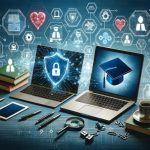Education is not merely a pathway to knowledge; it is the cornerstone of personal and societal growth. This article delves into the multifaceted impact of education, exploring its role in shaping individuals, fostering innovation, and building the foundation for a prosperous and enlightened society.
- Empowering Individuals: At its core, education empowers individuals by equipping them with knowledge, skills, and critical thinking abilities. It serves as a catalyst for personal development, enabling individuals to explore their potential, cultivate their talents, and build a strong foundation for lifelong learning. Education is the key to unlocking opportunities and realizing one’s aspirations.
- Fostering a Culture of Innovation: Education is the bedrock of innovation. It nurtures creativity, curiosity, and a thirst for knowledge – essential ingredients for groundbreaking ideas and discoveries. Through educational institutions, aspiring minds are exposed to diverse fields, sparking the cross-pollination of ideas that leads to innovation. The intersection of education and innovation propels societies forward, driving progress and addressing complex challenges.
- Building a Skilled Workforce: A well-educated workforce is the backbone of a thriving economy. Education prepares individuals with the skills and expertise needed in various industries, contributing to economic growth and competitiveness. As the landscape of work evolves, continuous learning and upskilling become imperative, emphasizing the ongoing role of education in shaping a dynamic and adaptable workforce.
- Promoting Social Equality: Education is a powerful tool for dismantling barriers and promoting social equality. Access to quality education ensures that opportunities are not confined to a select few but are accessible to individuals from diverse backgrounds. Education serves as a catalyst for social mobility, breaking the cycle of poverty and fostering a more inclusive and equitable society.
- Cultivating Informed Citizens: Informed citizens are the foundation of a robust democracy. Education cultivates critical thinking and civic responsibility, enabling individuals to actively participate in the democratic process. An educated citizenry is equipped to make informed decisions, engage in meaningful dialogue, and contribute to the betterment of society.
- Global Connectivity and Understanding: In an interconnected world, education plays a crucial role in fostering global understanding and collaboration. Exposure to diverse cultures, perspectives, and ideas broadens the horizons of individuals, promoting tolerance and mutual respect. Education is a bridge that connects people across borders, fostering a global community committed to addressing shared challenges.
- Environmental Consciousness: Education is instrumental in nurturing environmental consciousness and sustainability. It instills an understanding of the interconnectedness between humanity and the environment, fostering a sense of responsibility for the planet. Educated individuals are more likely to advocate for sustainable practices and contribute to efforts aimed at addressing environmental issues.
- Lifelong Learning: The journey of education does not end with formal schooling; it is a lifelong endeavor. The concept of continuous learning is essential in a rapidly changing world. Individuals, armed with a foundation of education, are better equipped to navigate evolving landscapes, adapt to new technologies, and embrace a mindset of lifelong learning.
In conclusion, education stands as a powerful force with far-reaching implications for individuals and society as a whole. Beyond the acquisition of knowledge, education shapes character, fuels innovation, promotes equality, and builds the foundation for a prosperous and enlightened future. As societies evolve, the significance of education in empowering minds and fostering positive change remains steadfast, illustrating its timeless and transformative power.





